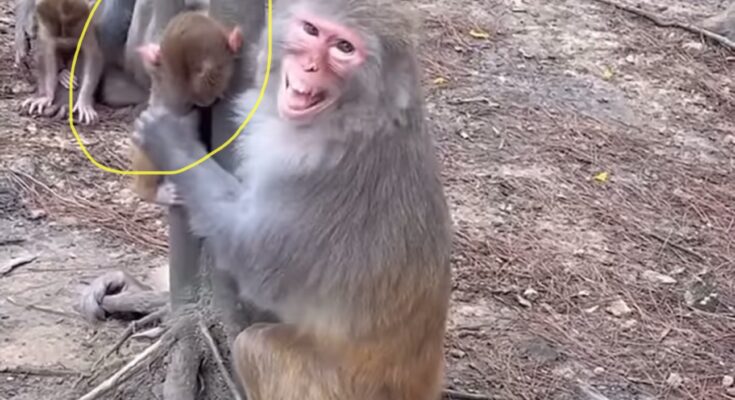A Tragic Loss in the Forest: Baby Monkey Dies After Being Trapped in Tree, Mother Left in Visible Mourning
In the heart of a dense forest in Southeast Asia, a heartbreaking scene unfolded that reminds us how deeply animals feel grief and loss. A baby monkey, barely a few months old, tragically died after becoming trapped in a hollow tree. The incident, which was observed and documented by local wildlife researchers, has left not only a painful mark on the troop but has visibly devastated the infant’s mother, who remains in mourning.
According to the field team monitoring the troop of long-tailed macaques, the infant was last seen playing near a cluster of older trees with its siblings. It’s believed the young monkey may have slipped into a narrow cavity while climbing, becoming wedged inside. Despite attempts from the mother and other members of the troop to help, the baby could not be freed.
What followed was a scene that echoes the very essence of maternal sorrow. The mother remained by the tree for nearly 48 hours, calling out in soft, distressed cries, attempting to reach her baby. She pulled at the bark, climbed around the trunk, and even refused food offered by others in her group.
“This kind of behavior is not just anecdotal—it’s grief,” said Dr. Laila Sumanti, a primatologist who was present during the event. “We often hesitate to anthropomorphize animal emotions, but time and again, we see primates exhibiting complex emotional responses to death, especially when it comes to their offspring.”
Eventually, the lifeless body of the infant was dislodged and retrieved by the troop. The mother carried the tiny body for another day, grooming it gently and shielding it from other curious members. This behavior, although difficult to witness, is not uncommon among primates and even other mammals such as elephants and dolphins.
Experts explain that such mourning behavior is likely rooted in the strong social and familial bonds animals form. For primates, especially, these bonds are critical to survival and development, and the loss of a baby disrupts more than just the emotional fabric—it shifts the entire social dynamic.
The incident has raised fresh questions about habitat safety and the impact of environmental changes on animal behavior. As forests face increasing pressure from human development, animals are often forced to adapt to rapidly shifting landscapes, which can increase the likelihood of tragic accidents like this one.
For now, the mother remains quieter than usual, staying close to the site where her baby died. Her troop has shown subtle signs of support—grooming her more frequently and allowing her to rest without disturbance. Whether animals understand death the same way humans do remains scientifically debated, but what is undeniable is that they feel the weight of loss in ways that mirror our own.
This story serves as a powerful reminder: the natural world is full of feeling, and every creature, big or small, carries within it the capacity for love—and grief.



